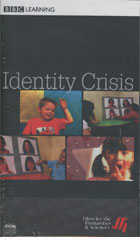
Identity Crisis 2004
Distributed by Films Media Group, PO Box 2053, Princeton, New Jersey 08543-2053; 800-257-5126
Produced by Angela Chan
Directed by Angela Chan
VHS, color, 60 min.
Adult
Child Development, Parenting, Education
Date Entered: 09/21/2005
Reviewed by Carolyn Walden, Mervyn H. Sterne Library, University of Alabama at BirminghamIn 2000, the British Broadcasting Corporation (BBC) began recording the lives of 25 children from all walks of life and geographical ranges in the United Kingdom to provide scientific research and documentation to support “what makes us who we are.” It examines the effects of genetics vs. parental influence and the environment in forming our personalities. The project is designed to last for 20 years and will follow the 25 children throughout their development in a series of films entitled Child of Our Time.
Identity Crisis, the first program in the 5th series is a documentary featuring 4 children at age five: James Cachia from south-east London who lives with his mother and siblings in an abusive situation with the boyfriend; William Roberts of Yorkshire, a strong-willed child from a wealthier background who engages in frequent conflict with his mother; Tyrese Blake-Hakeem, a black male child from Birmingham living with his mother and experiencing a recent divorce; and Rebecca Saunders, a Jewish girl from Essex whose mother sends complicated messages about food and body size. Because the project began when the children were born, the viewer is able to observe short film sequences from birth before viewing the scenarios of the 5-year olds in their present environment at home, school and play.
The video explores how these children begin to understand the implications of economic class, ethnicity, skin color, gender, physical appearance, and the presence or absence of both parents. The film also illustrates that 5-year olds have fixed ideas about economic class that affect their perceptions about what they will be. It is interesting that the confidence about physical appearance displayed by the 5-year old does affect their identity and self-confidence and shows a correlation with the perception parents have about their bodies. Especially significant are some surprising and even alarming results of a questionnaire designed to see how much these children and others in the project understand racial stereotypes, skin color, and behavior. However, for Tyrese in the film, positive experiences and attention to racial identity illustrates a significant effect on eliminating these racial stereotypes.
This particular video includes more time for the first two boys as they interact at home and school. The viewer sees clearly the family dynamic and the behavior of the children in various situations. As the promotional literature indicates “Identity Crisis brings vital documentation to the nature vs. nurture debate.” This attempt to create a long term recording of this debate is a significant contribution to the psychological literature and should be viewed in relationship to the other videos in the series. Background music is excellent, Professor Robert Winston as host is expressive but informative, and the shifting of scenes for each of the children is smooth and captures your attention.
Highly recommended in combination with other films in the series for collections in universities and public libraries with strong emphasis in child development, psychology and education.